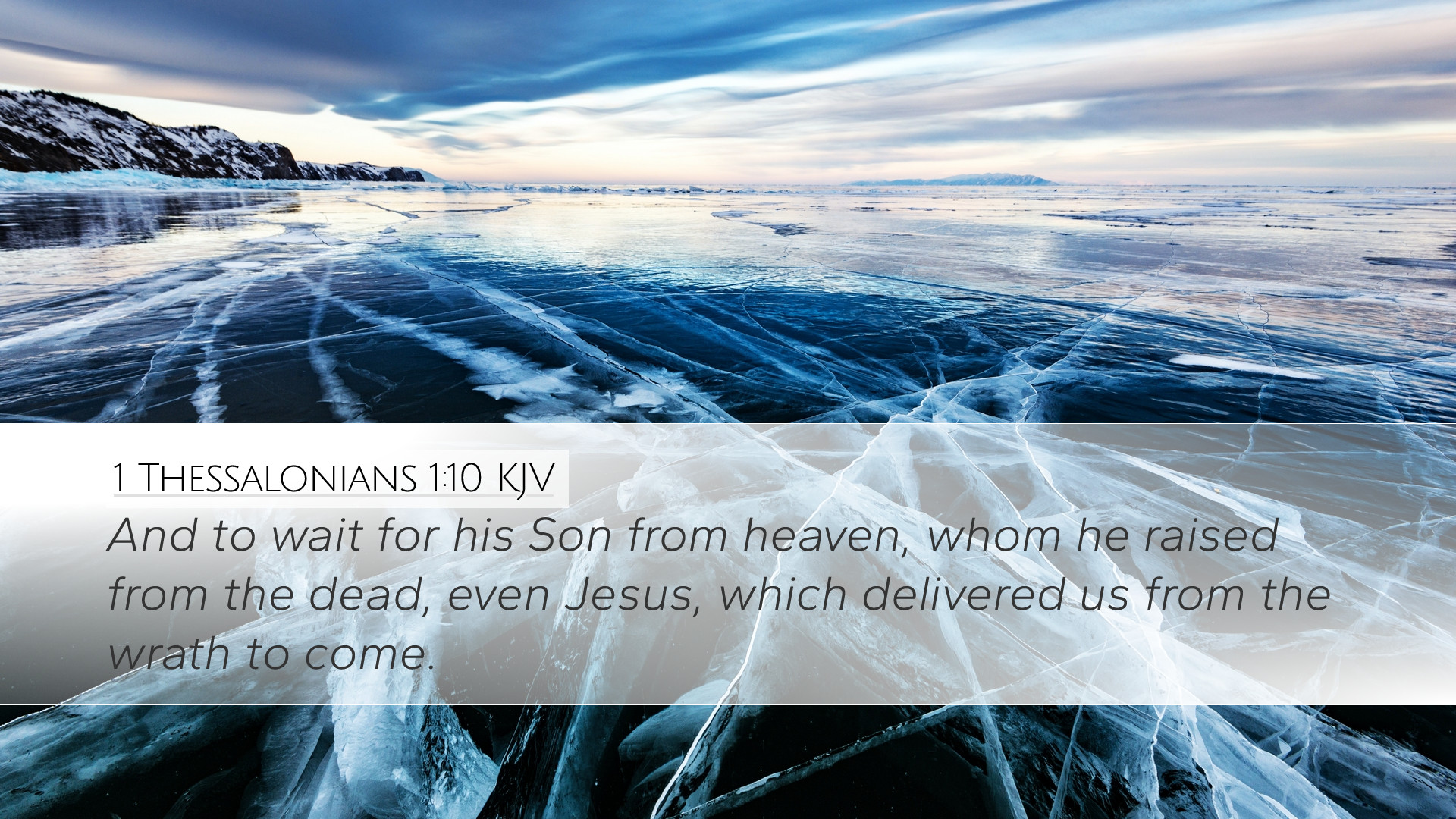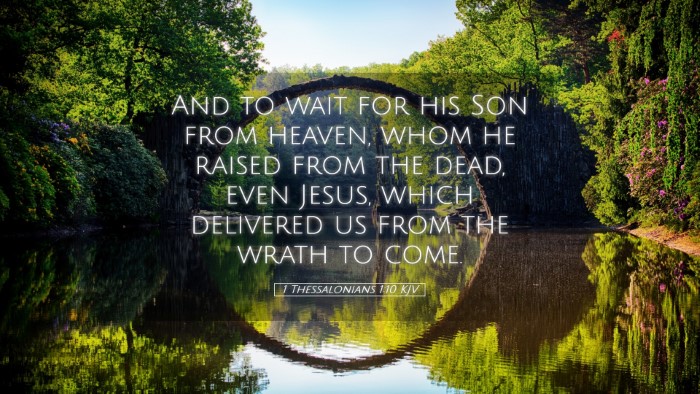Old Testament
Genesis Exodus Leviticus Numbers Deuteronomy Joshua Judges Ruth 1 Samuel 2 Samuel 1 Kings 2 Kings 1 Chronicles 2 Chronicles Ezra Nehemiah Esther Job Psalms Proverbs Ecclesiastes Song of Solomon Isaiah Jeremiah Lamentations Ezekiel Daniel Hosea Joel Amos Obadiah Jonah Micah Nahum Habakkuk Zephaniah Haggai Zechariah Malachi1 Thessalonians 1:10
1 Thessalonians 1:10 KJV
And to wait for his Son from heaven, whom he raised from the dead, even Jesus, which delivered us from the wrath to come.
1 Thessalonians 1:10 Bible Commentary
Commentary on 1 Thessalonians 1:10
Bible Verse: "And to wait for His Son from heaven, whom He raised from the dead, even Jesus, which delivered us from the wrath to come." (1 Thessalonians 1:10)
This verse serves as a profound conclusion to the opening chapter of Paul’s epistle to the Thessalonians. In it, the apostle emphasizes the fundamental Christian hope in the Second Coming of Christ and the salvation He provides. Various public domain commentaries provide additional insights that can enrich our understanding of this important text.
Contextual Analysis
The apostle Paul wrote this letter to the church in Thessalonica, a community undergoing significant persecution and challenges. In the preceding verses, Paul has praised their faith and industrious efforts. He transitions in verse 10 to the central theme of awaiting the return of Jesus, highlighting both the hope and the urgency of such an expectation.
Theological Significance
According to Matthew Henry, the verse encapsulates the essence of Christian doctrine: the anticipation of Christ’s return is not only a future event but also a present reality that influences the believer's life. It is a reminder that Christians live in hope and faith, relying on Jesus who is actively involved in their salvation.
Waiting for His Son
Albert Barnes notes that the term "wait for His Son" signifies a proactive expectation. This waiting is not passive; rather, it involves an active engagement in faith, prayer, and good works. Paul stresses that believers are called to live in a state of anticipation, which molds their character and conduct.
- Expectation: The notion of waiting involves a hopefulness that shapes daily living.
- Preparation: This waiting requires moral and spiritual readiness, urging believers to reflect on their lives.
Whom He Raised from the Dead
The resurrection of Jesus stands as the cornerstone of Christian faith. Adam Clarke highlights that this foundational event not only affirms Jesus' divinity but also assures believers of their own resurrection. The reference to Christ’s resurrection functions as a direct challenge to the despair surrounding mortality; death is not the end but the gateway to eternal life.
The Wrath to Come
Paul mentions "the wrath to come," which is significant in understanding the gravity of the human condition without salvation. Matthew Henry explicates that this refers to the impending judgment that awaits those who reject the gospel. In contrast, believers, by waiting for Jesus, are reassured of their security from this wrath due to their faith.
- The Urgency of Salvation: The text conveys a pressing need for evangelism; there is urgency in saving others from this impending wrath.
- Assurance for Believers: Those who trust in Jesus stand firm against judgment, for He delivers them.
Deliverance Through Christ
The verse concludes with assurance—Christ "delivers us from the wrath to come." Albert Barnes emphasizes the active role of Christ in salvation. It is through Christ alone that believers find refuge and safety. His role as a deliverer reassures believers of their standing and the grace they receive.
Practical Applications
For pastors and theologians, the insights from this verse invite reflection on the nature of hope and expectation in the believer's life. It challenges leaders to press into the hope of Christ's return and to encourage their congregations to live in readiness.
- Encouragement in Trials: Remind believers of the hope that sustains during hardships and trials.
- Focus on the Eternal: Encourage a life that prioritizes spiritual over earthly matters.
- Mission and Evangelism: Inspire active evangelism as a response to the impending wrath and the need for salvation.
Conclusion
1 Thessalonians 1:10 encapsulates the hope, assurance, and urgency of the Christian faith. It calls believers to live with an active anticipation of Jesus’ return and instills confidence in the resurrection and salvation. The combined insights from revered commentaries underscore the richness of theological truths intertwined in this single verse, offering profound implications for scholars, pastors, and lay believers alike.


